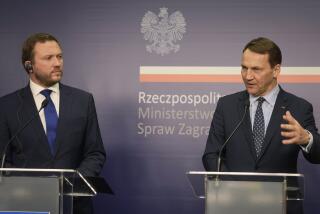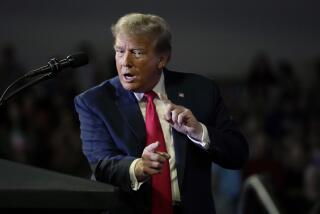Yeltsin Balks at Troop Pullout From Estonia : Summit: He steals the G-7 show, demanding better economic treatment. Group urges Bosnia accord.
As the world’s great powers embraced him as a near-equal at their summit Sunday, Russian President Boris N. Yeltsin demanded better economic treatment from abroad and bluntly denied that he plans to withdraw his last troops from the Baltics.
In a scene-stealing performance near the close of the industrial nations’ three-day gathering, Yeltsin declared at a news conference with President Clinton that he cannot commit to withdrawing the last 2,500 Russian troops from Estonia until that nation pledges better treatment for its large Russian minority. And he complained that the peers who are now accepting Russia into their institutions have been tardy in taking down Cold War-era trade barriers.
“Let’s give us equal rights. Get rid, once and for all, of that red jacket!” Yeltsin declared, referring to the Soviet-era curbs. “Take that red jacket from the president of Russia!”
Yeltsin left dour Soviet-style presentation in the dust, teasing his questioners and stealing the limelight with a series of one-liners and lighthearted banter.
Asked whether he plans to finally withdraw his Baltic troops, Yeltsin answered wryly: “ Nyet! I like that question--because I can answer no.”
While he does plan to remove remaining Russian troops from Latvia by Aug. 31, following a signed agreement, he said that “the situation is different in Estonia because there are very crude violations of human rights.”
Russian and Baltic officials have been wrangling since the Baltic republics gained independence three years ago over the treatment of thousands of former Soviet troops and their families, whom other residents of Latvia, Lithuania and Estonia long viewed as the agents of an occupying foreign power. For example, Estonians have been debating proposals that would effectively deprive many ethnic Russians of citizenship by requiring knowledge of the highly complex Estonian language as a precondition.
Yeltsin’s peppery comments came amid declarations of the growing harmony between the Russians and the leaders of the Group of Seven--the United States, Germany, Italy, Britain, France, Canada and Japan. Once their adversary, Yeltsin met with them Sunday for political discussions as a full partner in what is now referred to as the “political Group of Eight.”
In a final communique, the group called on the parties in the 27-month-old Bosnian war to accept by July 18 a partition plan that would give the Bosnian Muslims and Croats 51% of the country and the Bosnian Serbs the remaining 49%. The communique--along with a variety of personal statements by the leaders--was designed to increase pressure on the Bosnian Serbs, who have long balked at a settlement that would require them to surrender hard-fought territorial gains.
The leaders also called on North Korea to resume suspended negotiations with the United States over its nuclear program, and to go ahead with a scheduled summit with South Korean officials. The negotiations were broken off Saturday after the death of President Kim Il Sung, but U.S. officials said in Geneva that they might restart soon after Kim’s funeral next Sunday.
Yeltsin’s comments served notice that despite a much-proclaimed new sweetness in Russia’s relations with the industrial powers, he intends to keep speaking freely--particularly because it will help him counter recurring criticism at home that he has made too many concessions to foreigners.
Yeltsin’s words left his aides glowing with satisfaction but seemed to contradict declarations from Clinton minutes earlier that Russia and Estonia had “narrowed their differences” and might agree on the troops’ departure in the “near future.” Clinton announced that he had helped arrange a meeting between Yeltsin and Estonian President Lennart Meri, which he said he hoped will open the way for final troop departures by the end of August.
The Russian president’s pronouncement was also likely to set off new alarms in the Baltics, where government leaders and the non-Russian public have been determined to see a final withdrawal of the Russians by Aug. 31.
One U.S. official, smiling ruefully, acknowledged that Yeltsin’s pungent commentary “was not part of any pre-scripted” presentation that was to follow the two leaders’ afternoon talks. “That was a freewheeling press conference,” the official said with a sigh.
But U.S. aides said they considered the comments a negotiating tactic and that they also understood Yeltsin’s need to display his independence in order to put off criticism at home, including from his ultranationalist rivals.
“This is a vintage performance from a guy who’s having a good day,” one U.S. official said. “This is also for domestic consumption.”
Another said Clinton himself found the episode amusing proof of Yeltsin’s political skills.
And U.S. officials insisted that despite Yeltsin’s bravado, they expect the Russians to withdraw fully by the end of August. The United States has tried to ensure that withdrawal by providing 2,500 grants worth $25,000 each for former Soviet troops.
Referring to Clinton repeatedly as “Bill,” Yeltsin asserted that Russia is no longer the supplicant that has approached the advanced nations repeatedly since the fall of communism to ask financial assistance. Even so, he got in a jab at the Group of Seven nations for failing to deliver fully on the $4.34 billion they pledged at last year’s summit in Tokyo.
“It hurts a little bit” that Russia hadn’t so far received even half the money it was promised a year ago, Yeltsin lamented.
This year, Yeltsin came away from the summit with promises of only about $3.5 billion in new loans, and even that is dependent on modification of some rules of the International Monetary Fund and the World Bank.
Yeltsin’s specific economic grievance was that the United States has so far not dismantled Cold War-era laws intended to keep Communist countries from obtaining computer and aerospace technology that could be used to make weapons.
“This has to do with a certain discrimination toward Russia in trade,” Yeltsin said.
U.S. officials said the government intends to eliminate those Cold War-era export controls but has not gotten around to doing so. Officials intend to replace them with a new international rubric for controlling militarily valuable exports to pariah nations. Russia would be a member of the international group.
For Clinton, the summit was marred by the rejection of an Administration proposal intended to lead to a further lowering of trade barriers--an initiative most other Group of Seven leaders feared would complicate passage in their parliaments of the latest round of the global treaty called the General Agreement on Tariffs and Trade.
The final day of the summit displayed the mixed views Clinton’s peers hold of his leadership. While Yeltsin spoke warmly of Clinton, French President Francois Mitterrand offered a milder assessment.
Mitterrand, who Saturday led the hasty rebuff of Clinton’s trade initiative, said in a briefing that Clinton is “young, and not unintelligent.”
U.S. aides, meanwhile, said the downbeat assessments of Clinton’s performance overlooked his behind-the-scenes efforts, including his successful effort to make other leaders commit to what turned out to be a $4-billion package of benefits for Ukraine. Other European officials acknowledged that Clinton had, in fact, pressed for the commitment, which is expected to give Ukrainian President Leonid Kravchuk an important boost.
The Group of Seven leaders spoke loudest on Bosnia-Herzegovina.
Yeltsin said the group will act with “as much character as we have in our bodies.” In the negotiations, Yeltsin was also emphatic on the need to stop a war that has claimed an estimated 200,000 lives. At one point, he clasped his hands in front of himself and said, “We’re together on this; we’re going to get it done.”
British Prime Minister John Major warned that “the risk of this war spreading is very real.”
The final statement carried an implicit threat that the group will lift the arms embargo against the Bosnian Muslims if the Serbian fighters do not go along.
Officials said the group discussed North Korea, including the murky question of who will succeed Kim Il Sung. The communique called on the country to “remove, once and for all, the suspicions surrounding its nuclear activities.”
But the G-7 leaders did not agree on what they will do if North Korea’s new leadership ignores pressure on the country to end its nuclear program.
More to Read
Start your day right
Sign up for Essential California for news, features and recommendations from the L.A. Times and beyond in your inbox six days a week.
You may occasionally receive promotional content from the Los Angeles Times.







